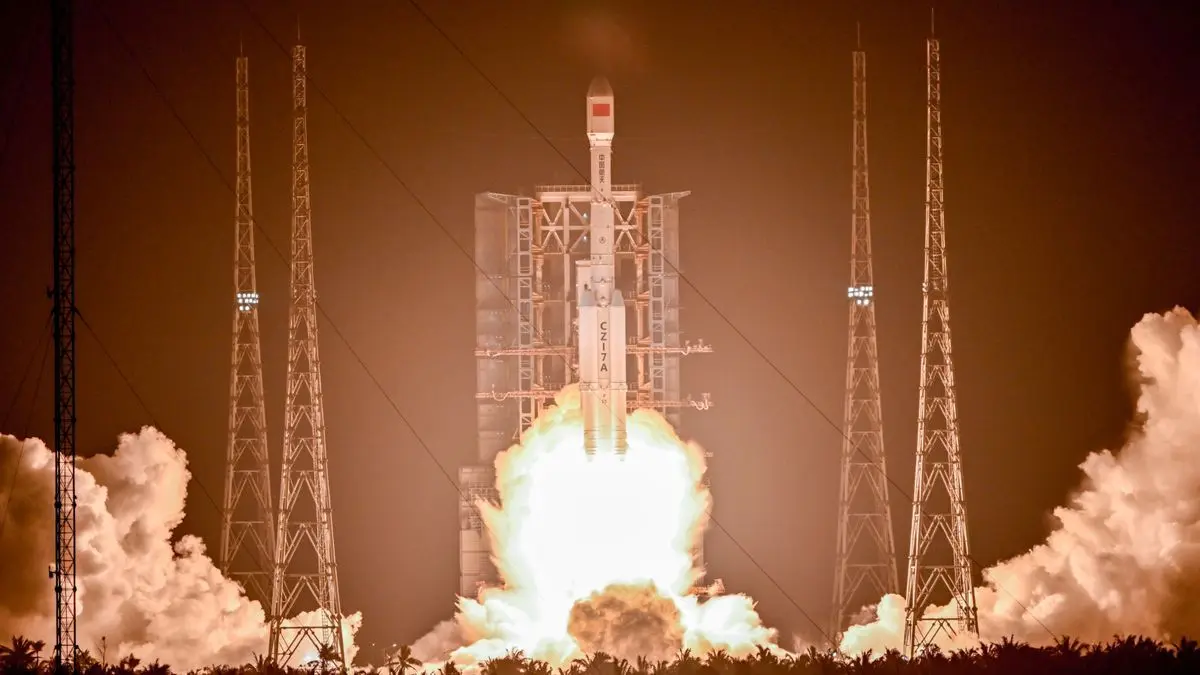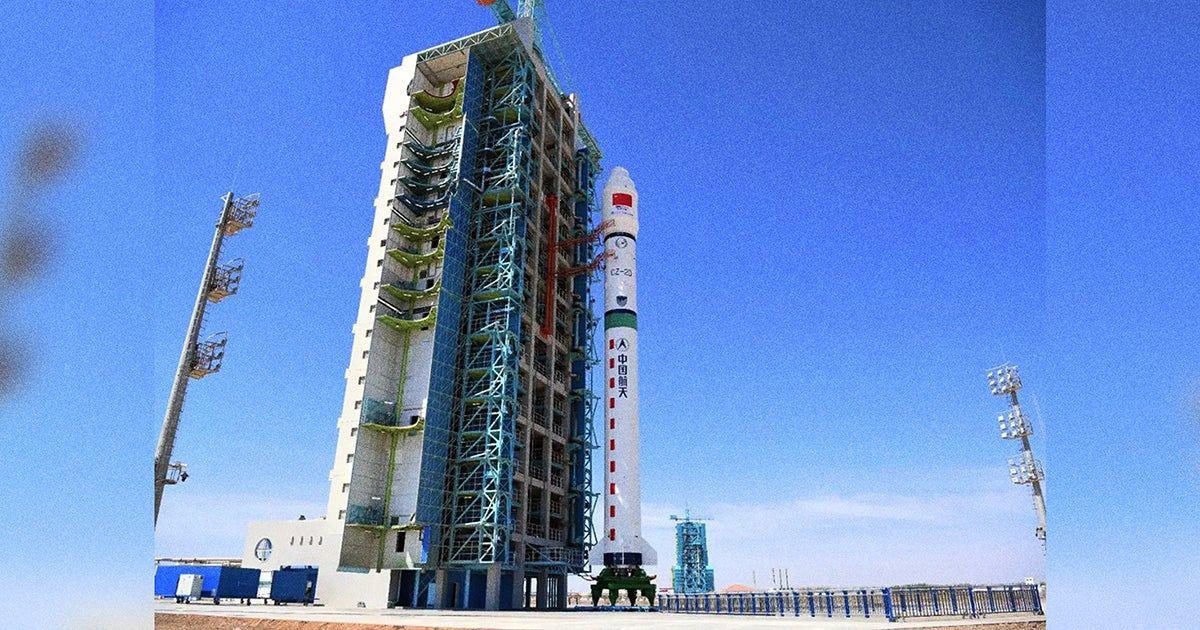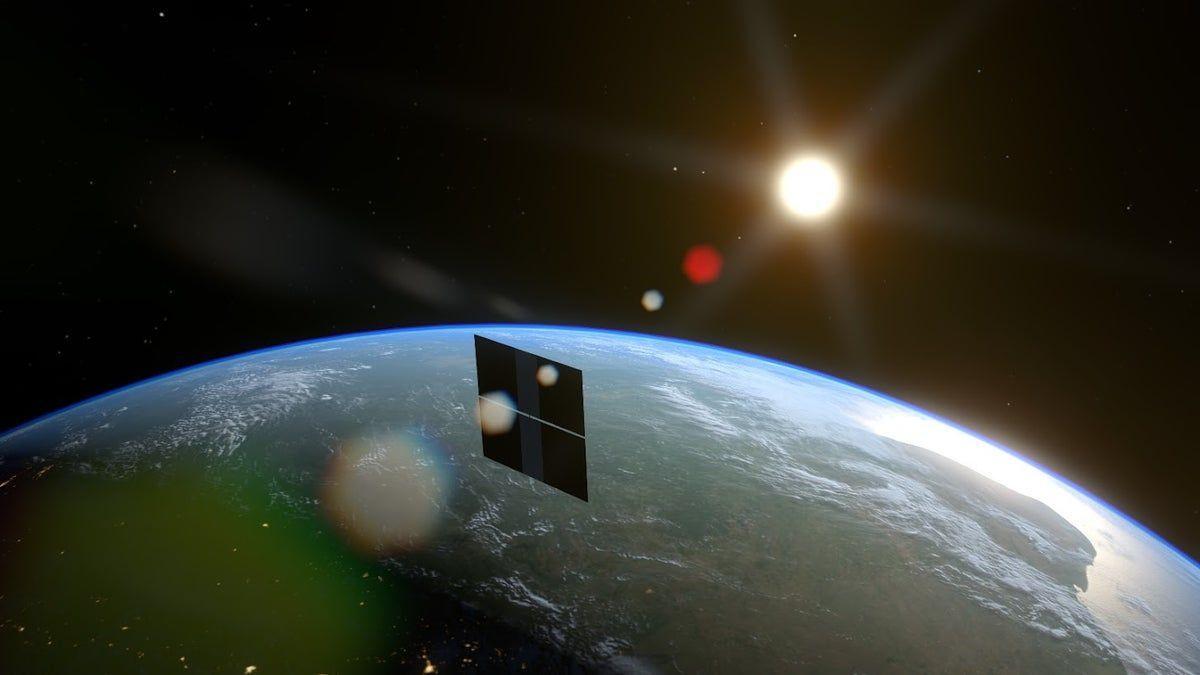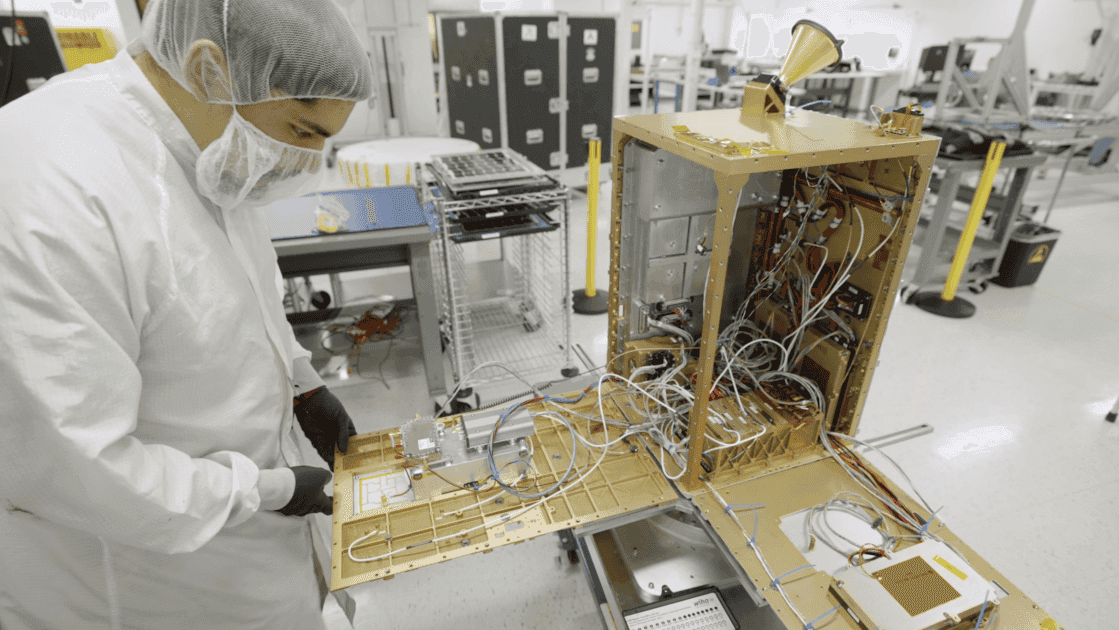China Launches First AI Satellite Cluster for Space-Based Supercomputing Constellation
3 Sources
3 Sources
[1]
China is building a constellation of AI supercomputers in space -- and just launched the first pieces
China launches a Long March rocket carrying communication equipment from Wenchang Space Launch Site on May 20, 2025. (Image credit: VCG/VCG via Getty Images) China has launched its first cluster of satellites for a planned artificial intelligence (AI) supercomputer constellation in space. The 12 satellites are the beginnings of a proposed 2,800-satellite fleet led by the company ADA Space and Zhejiang Lab that will one day form the Three-Body Computing Constellation, a satellite network that will directly process data in space. The satellites, which launched on board a Long March 2D rocket from China's Jiuquan Satellite Launch Center May 14, are part of a plan to lower China's dependence on ground-based computers. Instead, the satellites will use the cold vacuum of space as a natural cooling system while they crunch data with a combined computing capacity of 1,000 peta (1 quintillion) operations per second, according to the Chinese government. "It's a good time to think about how we can put AI into space, not just in your laptop or cellphone," Wang Jian, director of Zhejiang Lab, said at the Beyond Expo tech conference in Macau Wednesday (May 21), the South China Morning Post (SCMP) reported. "Space has, again, become the frontier for us to think about what we can do in the next 10, 20 or 50 years." Whether satellites are used for GPS systems, climate sensors, telescopes, weather forecasting or communication, many organizations increasingly rely on the observations made by orbiting spacecraft. But this raw data needs to be crunched back on Earth, meaning it's limited by transmission bandwidths and the narrow windows it can be sent as satellites pass over ground stations, meaning a lot of it is lost. Related: China plans to build enormous solar array in space -- and it could collect more energy in a year than 'all the oil on Earth' To overcome this restriction, companies have begun designing satellites capable of "edge computing," where raw data is processed on board the satellite before being transmitted down to the ground. Doing these energy-intensive computations in orbit also allows the satellites' power to be drawn from solar panels and their waste heat radiated into space, thereby lowering their carbon footprint. Each satellite in China's launch contains an 8 billion-parameter AI model that can perform 744 tera operations per second (TOPS), according to a translated ADA Space statement, with the number shooting up to five peta operations per second when their processing power is combined. For reference, Microsoft's AI Copilot+ laptops can currently process at a rate of around 40 TOPS. Orbiting in an array, the satellites will communicate with each other using lasers, one of which is equipped with an X-ray polarization detector for studying cosmic phenomena such as gamma-ray bursts. The computing constellation gets its name from the three-body problem, a question first formulated by Isaac Newton that involves predicting the chaotic motion of three objects orbiting each other under the effects of gravity. The quandary served as inspiration for the renowned science-fiction trilogy of the same name written by Chinese author Liu Cixin, alongside a Netflix adaptation. This initial inspiration carries over to the purported aims of the constellation, according to Wang, who highlighted the complexities of working with multiple entities in a call for increased international cooperation in the project. He claimed that the array will permit other international organizations to build and use its computers, the SCMP reported. Although the U.S. and Europe have performed tests on space computers, China's array is the first to be deployed at an operable scale. Meanwhile, former Google CEO Eric Schmidt, following his purchase of a controlling interest in the California launch company Relativity Space, has proposed launching data centers into orbit. "People are planning 10 gigawatt data centers," Schmidt said during an April 9 hearing with the U.S. House Committee on Energy and Commerce. "It gives you a sense of how big this crisis is." "One of the estimates that I think is most likely is that data centers will require an additional 29 gigawatts of power by 2027, and 67 more gigawatts by 2030," he added. "These things are industrial at a scale that I have never seen in my life."
[2]
China Is Building an AI-Powered Supercomputer Network in Space
China is launching a space-bound AI supercomputer -- and the first batch of the satellites it's comprised of was just sent up. As the South China Morning Post reports, the so-called "Three-Body Computing Constellation" project launched the first 12 of its planned 2,800 satellites last week from the Jiuquan Satellite Launch Center in northwest China. The orbital supercomputer network will, when complete, allow for rapid in-orbit data processing rather than relying on terrestrial computing facilities to relay information to Earth and then back up to space. It also doesn't require the copious amounts of water ground-based computers need to stay cool. Each satellite, the SCMP notes, carries an eight-billion-parameter AI model that can process raw data in orbit. Paired with the satellites' massive computing power of one quintillion operations per second, the constellation is expected, when complete, to rival the world's most powerful terrestrial supercomputers. Launched from northwest China's Jiuquan Satellite Launch Center, each satellite carries, per a statement from the ADA Space startup that helped launch the constellation, unique scientific payloads that can do everything from detect gamma ray bursts to create "digital twins" of Earth terrain for emergency services and other industries. While the concept of orbital computing is nothing new, this project is, as Harvard astronomer Jonathan McDowell told SCMP, "the first substantial flight test" of the gambit. As McDowell pointed out, theoretical space cloud computing projects are "very fashionable" right now, with private companies like Axiom Space and Jeff Bezos' Blue Origin planning their own orbital computing satellites. Unlike terrestrial data centers, which, according to the International Energy Agency are on track to use as much energy as Japan by 2026, orbital data centers can "use solar power and radiate their heat to space, reducing the energy needs and carbon footprint," as McDowell told SCMP. With the launch of the first of its 2,800 satellites, China's orbital supercomputer puts the country ahead of the United States in the rival countries' space race, though there's no telling which will actually cross the finish line first.
[3]
China's First AI Satellite Cluster Takes Supercomputing to Space
Satellites use laser links and space cooling to cut energy use China has successfully launched the first cluster of 12 satellites of its ambitious Three-body computing constellation on May 14 from the Jiuquan Satellite Launch Center aboard a Long March 2D rocket. The complete supercomputing network will comprise 2,800 satellites and will deliver a combined computing capacity of 1,000 peta operations per second (POPS). The twelve satellites currently in orbit are interconnected through high-speed laser communication links that transfer data at up to 100 gigabits per second. This initiative will be using the cold vacuum as a natural cooling system and it might be able to shift the AI processing from Earth to the space. This project is led by the company ADA Space and Zhejiang Lab. According to a translated ADA Space statement, each satellite in China's launch contains an 8 billion-parameter AI model that can perform 744 tera operations per second (TOPS). When combined together, their processing power will be able to perform five peta operations per second. Traditionally, satellites collect raw data and transmit it back to Earth, limited by narrow bandwidths and transmission windows. This causes data loss and processing delays. By processing data in space, the system cuts transmission needs and takes advantage of solar power and space's natural cooling, reducing energy consumption and environmental impact. According to Zhejiang Lab's Wang Jian, the platform is open to international use, encouraging other countries and organizations to take part in its development. Although the U.S. and Europe have performed tests on space computers, China's array is the first to be deployed at an operable scale. Meanwhile, former Google CEO Eric Schmidt, following his purchase of a controlling interest in the California launch company Relativity Space, has proposed launching data centers into orbit.
Share
Share
Copy Link
China has successfully launched the first 12 satellites of its ambitious Three-Body Computing Constellation, aiming to create a space-based AI supercomputer network that will revolutionize data processing in orbit.
China's Ambitious Space-Based AI Supercomputer Project
In a groundbreaking move, China has successfully launched the first cluster of 12 satellites for its ambitious Three-Body Computing Constellation project. This initiative, led by ADA Space and Zhejiang Lab, aims to create a space-based artificial intelligence (AI) supercomputer network comprising 2,800 satellites
1
2
3
.Launch Details and Project Scale

Source: Gadgets 360
The initial 12 satellites were launched on May 14, 2023, from China's Jiuquan Satellite Launch Center aboard a Long March 2D rocket
1
3
. This launch marks the beginning of a project that, when completed, will deliver a combined computing capacity of 1,000 peta (1 quintillion) operations per second (POPS)3
.Advanced Satellite Capabilities
Each satellite in the constellation is equipped with an 8 billion-parameter AI model capable of performing 744 tera operations per second (TOPS)
1
3
. The satellites are interconnected through high-speed laser communication links, enabling data transfer at up to 100 gigabits per second3
. One satellite is also equipped with an X-ray polarization detector for studying cosmic phenomena such as gamma-ray bursts1
.Innovative Space-Based Computing
The Three-Body Computing Constellation represents a significant shift in data processing methodology. Traditionally, satellites collect raw data and transmit it back to Earth, limited by narrow bandwidths and transmission windows. This new approach aims to process data directly in space, reducing data loss and processing delays
1
3
.Environmental and Energy Considerations
By leveraging the cold vacuum of space as a natural cooling system and utilizing solar power, the project aims to significantly reduce energy consumption and environmental impact compared to terrestrial data centers
1
2
. This approach addresses growing concerns about the increasing energy demands of ground-based data centers, which are projected to consume as much energy as Japan by 20262
.Related Stories
International Collaboration and Competition
Wang Jian, director of Zhejiang Lab, has emphasized the project's openness to international participation, encouraging other countries and organizations to contribute to its development
1
3
. While the United States and Europe have conducted tests on space computers, China's array is the first to be deployed at an operable scale1
2
.Future Implications and Industry Trends

Source: Live Science
The success of this project could have far-reaching implications for various industries, including emergency services, climate monitoring, and telecommunications
2
. It also represents a significant advancement in the ongoing space race between major powers, particularly China and the United States2
.As the project progresses, it will be crucial to monitor its impact on global computing capabilities, space exploration, and international technological cooperation. The Three-Body Computing Constellation has the potential to reshape our approach to data processing and AI applications in space, opening new frontiers in scientific research and technological innovation.

Source: Futurism
References
Summarized by
Navi
[1]
Related Stories
Google Announces Project Suncatcher: Ambitious Plan for AI Data Centers in Space
04 Nov 2025•Technology

Google Plans Space Data Centers to Power AI with Solar Energy, Targets 2027 Launch
02 Dec 2025•Technology

Nvidia H100 GPUs Set to Launch Into Orbit as Startups Pioneer Space-Based AI Data Centers
22 Oct 2025•Technology

Recent Highlights
1
ByteDance's Seedance 2.0 AI video generator triggers copyright infringement battle with Hollywood
Policy and Regulation

2
Demis Hassabis predicts AGI in 5-8 years, sees new golden era transforming medicine and science
Technology

3
Nvidia and Meta forge massive chip deal as computing power demands reshape AI infrastructure
Technology





